
Alphabetical Menu
Chronological Menu
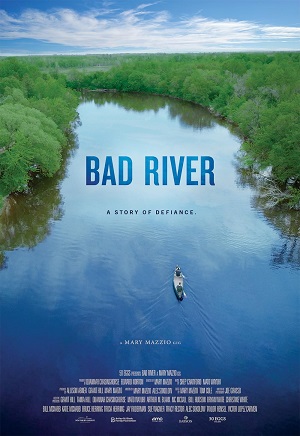
Bad River is an eye-opening, provocative and enraging documentary about the struggles of Bad River Band, a Chippewa reservation in Wisconsin, to protect and preserve their native land. They're worried about Line 5, an old pipeline running through their land that's at risk of bursting and contaminating Lake Superior with toxins. Enbridge, a pipeline and energy corporation, owns the pipeline. Director Mary Mazzio interviews many members of the Bad River Band Reservation each of whom provides insights and shares their candid feelings about their battles to protect their sacred land. Their voices matter, so kudos to Mazzio for showing compassion and empathy by allowing them to speak their mind and to share their side of the story in a way that feels genuinely heartfelt. Bad River manages to be both informative and engaging without becoming dry or academic. You'll learn about the history of Bad River Band and their legal battles with Enbridge who aren't willing to take responsibility for the consequences of Line 5's threat to the Bad River Band Reservation. Narrated by Quannah Chasinghorse and Edward Norton, this empowering documentary is a powerful call for truth, justice and, above all, democracy, in a country with a dysfunctional democracy. It also features stunning cinematography that captures the majesty of the Bad River Band's land. Bad River will probably make most audiences feeling indignant, as they have every right to feel, but also empowered. After all, knowledge is power. Decency is a major strength. As Pablo Neruda once wisely wrote in a poem, "They can cut all of the flowers, but they can't stop the spring from coming." Bad River is a potent reminder that there is, indeed, a sliver hope for truth, justice and democracy. At a running time of 1 hour and 27 minutes, it opens in select theaters in NYC, LA, Boston, Chicago, Washington, DC, Seattle, Milkwaukee, Detroit, Atlanta, Madison, WI, Ashland, WI, and Minneapolis. 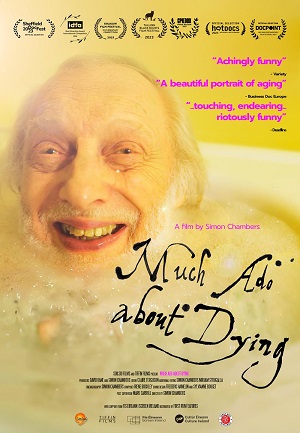
Much Ado About Dying is a warm, intimate, honest, funny and profoundly moving roller coaster ride of emotions. Director Simon Chambers films his elderly uncle, David, who's frail and claims to be dying. There's a voyeuristic aspect to watching the documentary because you're watching David during his very private moments. It's almost as emotionally devastating and hard to watch as The Eternal Memory, although this isn't a documentary that deals with dementia. The topics it does deal with are broads. They range from sadness to joy to passion and to King Lear and more, so focus and structure aren't among the film's strengths. It also becomes a little exhausting at times. However, through compassion and empathy, director Simon Chambers does an effective job of capturing his uncle's wit, sense of humor, intelligence, suffering, vulnerabilities and, above all, his humanity. The film even has some images that can be seen as visual poetry, i.e. the shots of rain. At just 1 hour and 24 minutes, Much Ado About Dying opens at Film Forum via Cosmic Cat.
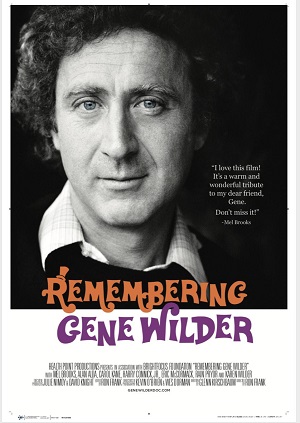
Remembering Gene Wilder is a captivating, insightful and profoundly moving documentary biopic about legendary actor, comedian, director and writer Gene Wilder. Through terrific editing, director Ron Frank deftly combines archival interviews with Gene Wilder himself along with film clips and contemporary interviews with his colleagues, like Mel Brooks, Alan Alda and Carol Kane. You'll learn about how Anne Bancroft raved about her co-star in the play "Mother Courage and Her Children" to her husband, Mel Brooks, who wanted to cast him in The Producers the second he saw him perform. When they met, he told Wilder a joke that made him laugh hysterically. Mel candly talks about how he misses his laughter. There's plenty of interesting anecdotes about Wilder's film career as well as Mel's career, too, i.e. that Mel initially didn't think that the Puttin' on the Ritz dance from Young Frankenstein would actually work, but he changed his mind after Gene Wilder and Peter Boyle performed it. Willy Wonka and the Chocolate Factory wasn't as big of a hit as Young Frankenstein, though, but ended up becoming a classic nonetheless. Roger Ebert's rave review, which hit the nail on the head about the film's greatness, is referenced here. You'll also learn about Gene Wilder's idea for the grand entrance in that film which impressed its director. Remembering Gene Wilder goes beyond just shedding light on Gene Wilder's work; it also delves into his love life, his childhood, his love for painting with watercolor, his relationship with his ailing mother which is where he honed his comedic skills because his father told him to make her laugh. The film captures Wilder's warmth, charisma, sense of humor, personality, intelligence, and, above all, his humanity. Don't be surprised if you're a little teary-eyed during the heart-wrenching scenes showing the last days of his life when he was suffering from Alzheimer's. At 1 hour and 32 minutes, <Remembering Gene Wilder opens at Quad Cinema via Kino Lorber. The Animal Kingdom 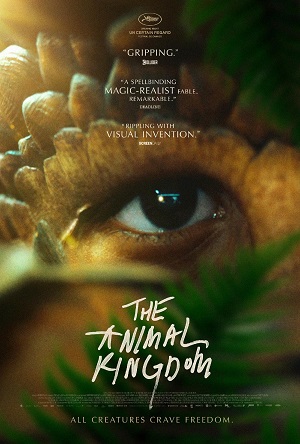 François (Romain Duris) takes his 16-year-old son, Émile (Paul Kircher), to live in the French countryside after his wife has turned into a she-wolf and taken away from him. Émile desperately wants to reunite with his mother, but he has a different problem when he begins to transform into a wolf.
Writer/director Thomas Cailley and co-writer Pauline Munier throw the audience right into the middle of the futuristic world where humans have transformed into human/creature hybrids. François and Émile hope that they can start afresh at a home by the countryside. However, the possibility that François' wife might be alive somewhere after a van carrying hybrids crashes into a lake haunts them. Émile flirts with Nina (Billie Blain), a girl from school. Not surprisingly, when he begins to develop symptoms of physical transformation, he tries to hide it from her as well as from his father. He also befriends a bird/human hybrid called Fix (Tom Mercier) and feeds him fish in the forest. The Animal Kingdom has an interesting concept, but doesn't take its ideas far enough. It starts to feel repetitive around the hour mark as the plot meanders without anything surprising or revealing about any of the characters. The relationship between François and Émile remains the heart and soul of the film, though. So, in a way, it's not just a sci-fi movie or coming-of-age movie, but also a story about unconditional love and self-acceptance. How did the transformations happen exactly? Why do they happen? Is it a global issue? There are subplots, i.e. with a police officer (Adèle Exarchopoulos) investigating local killings, that are dull and underdeveloped. World-building and exposition aren't among the film's strengths, unfortunately, nor does it make the most out of its potential to be a provocative, scary and gripping sci-fi thriller . The Animal Kingdom is lucky to have Romain Duris and Paul Kircher in the lead roles because they both give moving performances that ground the film in authenticity. Even though the film's sci-fi, horror and thriller elements are weak, the evolving father/son relationship feels organic and the most engaging element. Adèle Exarchopoulos is wasted in an unwritten role, though. There are some scenes with graphic gore that might make some audiences a little uneasy, but that's kept to minimum. This isn't the kind of film that relies on violence and gore to entertain. Nor does it rely on excessive CGI effects. Although it never becomes exhausting per se, it does overstay its welcome and could've used tighter editing because there are pacing issues. At 2 hours and 8 minutes, The Animal Kingdom is mildly engaging, well-acted and surprisingly poignant, but overlong, repetitive and undercooked.
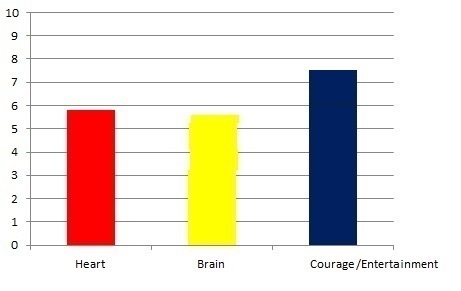 Arthur the King 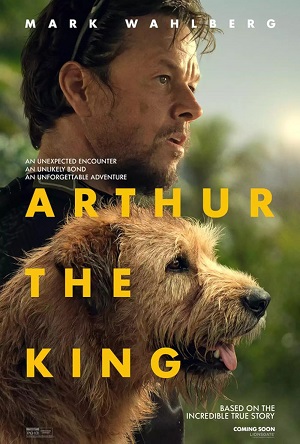
Michael Light (Mark Wahlberg) has always loved adventure racing, but after failing to win an important race, he moves on to a career selling real estate for his father, Charlie. With encouragement from his wife, Helena (Juliet Rylance), and daughter, Ruby (Cece Valentina), he gets a second chance to win another race in the Dominican Republic. He assembles a team which include Leo (Simu Liu), Chick (Ali Suliman), Hugo (Oscar Best), and Hugo's daughter, Olivia (Nathalie Emmanuel). A stray dog, which he names Arthur the King, eventually joins their race.
The screenplay by Michael Brandt, based on the book by Mikael Lindnord, follows a conventional underdog sports movie formula, but it follows that formula while wearing its heart firmly on its sleeve. Even if you're already familiar with the true story that it's based on and can predict what will happen, it's still a thoroughly engaging and engrossing adventure film. There's nothing inherently wrong with predictability or sticking to a formula. Arthur the King finds just the right balance between its thrilling adventure scenes, comic relief and poignant scenes that tug at the heartstrings. The most exciting scene is the zipline rescue which also feels intense and suspenseful. Those latter types of scenes are the cuts to Michael's wife and daughter who track his location during the race on a computer. The plot occasionally shifts to focus on the stray dog wandering through the streets, but, soon enough, inevitably, it crosses paths with Michael and his racing team. That's when the film becomes truly poignant as you watch Michael bond with the dog. They pretty much become inseparable. To be fair, some of the dialogue is cheesy and a little heavy-handed, but those are forgivable flaws in an otherwise exhilarating experience that has enough spectacle that's grounded in humanity. The performances are all-around decent, but it's ultimately the dog that shines the brightest and steals the show. He's the film's true MVP. That said, there's a powerful scene where Michael lashes out in anger and frustration at airport staff for a good reason. That's Wahlberg's most well-acted scene in the film, and he even gets to use the F word once. The cinematography is also exceptional with some breathtaking scenery and birds-eye-view shots that provide some scope while also making the film very cinematic and worth seeing on the big screen. The pace moves at just the right speed---not too fast or too slow. At a running time of just 1 hour and 30 minutes, Arthur the King is a triumph. It's a captivating, thrilling and heartfelt journey that will make you stand up and cheer.
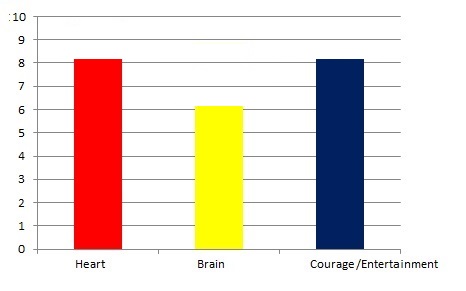 Club Zero 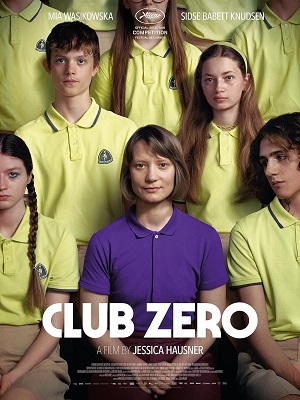 Ms. Novak (Mia Wasikowska) starts a new job at a boarding school where she teaches about "conscious eating" to a group of students, Fred (Luke Barker), Elsa (Ksenia Devriendt), Ben (Samuel D. Anderson) and Ragna (Florence Baker), among others. Her radical nutritional lessons involve fasting, limited eating and discipline, but the school board including the headmistress, Dorset (Sidse Babett Knudsen), aren't pleased with her nor are the students' parents. She gets into hot water when getting too close to Fred.
The screenplay by writer/director Jessica Hausner and co-writer Géraldine Bajard deftly blends drama, psychological horror and thrills. Club Zero isn't a palpable thriller or horror film, but a more understated one that looks unflinchingly at eating disorders. It's essentially a cautionary tale about believing in something that sounds radical while blinding believing those who teach the radical ideas. Ms. Novak seems like she's friendly and innocent on the surface, but she gradually becomes more and more of a danger to her students as she brainwashes them about "conscious eating." That term hides the fact that it requires people to limit or stop eating. The film doesn't provide much backstory about Ms. Novak or her love life. However, it does show that she doesn't quite understand that her actions have consequences because she underestimates how her radical class will affect her students emotionally, physically and in the long run. She also doesn't consider what their parents might think if they realize what she's teaching their children at the boarding school. After all, the teens are still children with developing brains, so they're impressionable. Is Ms. Novak merely taking advantage of them? If so, what does she have to gain from that? Her inappropriate relationship with Fred is also a little vague and open to more interpretation depending on whom you believe. Club Zero compels the audience to ask questions, but doesn't spoon-feed the answers to them. Nor does it turn Ms. Novak into a villain. The film does go into dark territory with some creepy and grotesque scenes without being heavy-handed, too shocking or very intense. Mia Wasikowska gives a nuanced performance that's emotionally cold which might be part of the film's point. Ms. Novak is far from a good role model as a teacher. Perhaps her coldness masks all the emotions that she bottles up inside. Either way, Mia Wasikowska does her best to open the window into Ms. Novak's inner life, but the film holds back on allowing her to open it too widely. Writer/director Jessica Hausner and co-writer Géraldine Bajard leave some things to the audience's imagination, like someone committing suicide, while other things like someone vomiting leaves nothing to the imagination. So, it's a mix of implicit elements and explicit elements, both of which are designed to make the audience uncomfortable in different ways. Moreover, the music score does an effective job of enhancing the film's dark tone. At 1 hour and 50 minutes, Club Zero is a provocative and disturbing psychological thriller.
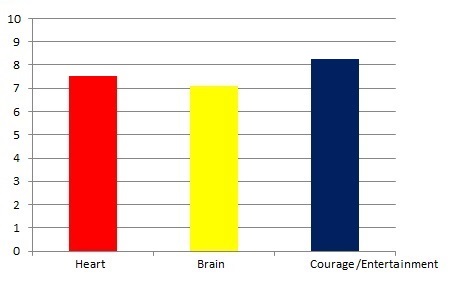 French Girl 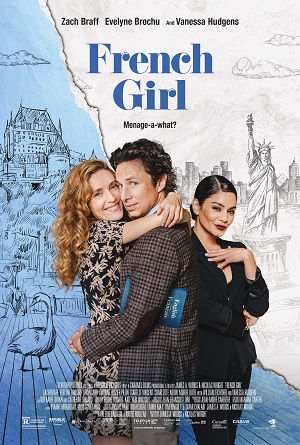 Gordon (Zach Braff) lives with his girlfriend, Sophie (Évelyne Brochu), in Brooklyn, and works as an English teacher at a middle school. When she gets an opportunity to become a chef at the restaurant of her former lover, Ruby (Vanessa Hudgens), in Canada, she and Gordon move to Quebec City where he meets her family for the first time. The screenplay by co-writers/directors James A. Woods and Nicolas Wright starts on a somewhat more serious note before veering right into comedy when Gordon accidentally takes a Quaalude instead of anxiety medicine on an airplane. Cue the reaction shots of Sophie's parents who, unsurprisingly, don't like him right away. He has a tough time impressing them, but he has to because he plans on proposing to Sophie. The person who stands in his way, though, happens to be Ruby, Sophie's former lover. The film suddenly turns into a love triangle, but not a very compelling one nor does it embrace its potential to become a screwball comedy. Imagine 2 Days in Paris without any jokes that land. Or the recent misfire My Big Fat Greek Wedding 3. That's what it feels like to watch French Girl which feels more like a sitcom with one-note characters who are nothing more than boring, forgettable caricatures. Unfortunately, none of the actors or actresses manage to rise above the lazy and bland screenplay. Zach Braff and Évelyne Brochu lack palpable chemistry, so it's hard to care about whether or not they end up together. The pace moves briskly enough, yet the film still feels like it overstays its welcome as it drags on and on with very little momentum while approaching the 2 hour mark. At 1 hour and 50 minutes, French Girl is uninspired, witless and more silly than funny. As a romantic comedy, it's sorely lacking both romance and comedy.
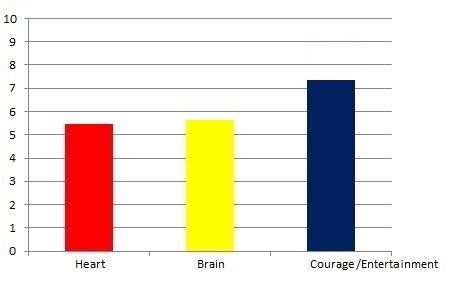 Knox Goes Away 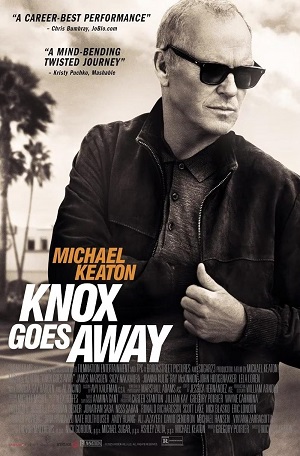 John Knox (Michael Keaton), a hitman, gets diagnosed with an aggressive form of dementia. He accidentally kills his partner, Muncie (Ray McKinnon), and must cover-up his crime. Meanwhile, his estranged son, Miles (James Marsden), shows up to confess that he murdered an older man who slept with his teenage daughter. John agrees to help him to cover-up his crime. The screenplay by Gregory Poirier deftly blends crime thriller and father/son drama. Knox Goes Away also serves as a portrait of a broken man who's not a good person, but he's trying to be a good father now that he doesn't have much longer to live because of dementia. To be fair, much of the plot feels contrived with not enough exposition or backstory. How did John end up working as a hitman? How did he meet another hitman, Xavier (Al Pacino)? How long have they been friends? What was his relationship like with his father? He has an ex-wife (Marcia Gay Harden), as it turns out, but how does she feel about him being a hitman or how did he manage to hide it from her for so long? How introspective is he? He doesn't have much of a character arc because the film isn't very interested in exploring his emotional journey. As his doctor tells him, he may not remember specific things, but he's capable of remembering emotions. If only the film were to delve deeper into those emotions, i.e. his feelings for his ex-wife. Nonetheless, the relationship between him and his son has a few heartfelt moments like when they just sit down to eat and talk while reconciling. The only characters who seem like they belong in a different movie are the two police detectives who aren't very bright. They're merely there as plot devices while providing some clunky comic relief. Michael Keaton gives a charismatic, nuanced and convincingly moving performance as John Knox which helps to make an unlikeable person easier to tolerate. John isn't a character who's easy to root for, though. To be fair, the film doesn't ask the audience to judge him; just to experience him. Marcia Gay Harden and Al Pacino are wasted in roles that deserve to be more meaty and complex. There's some violence, but it's not excessive nor does it aim for shock value like Love Lies Bleeding which has lots of blood and guts. Knox Goes Away doesn't break new ground, and the ending isn't very plausible in hindsight. However, it's a gripping and engrossing crime thriller with a fine ensemble cast. Michael Keaton is in top form.
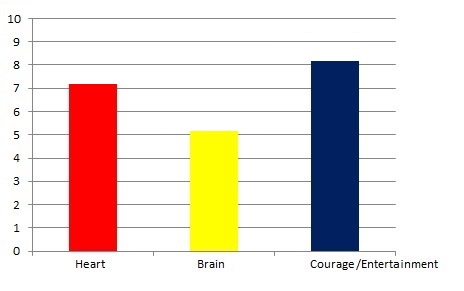 The Neon Highway 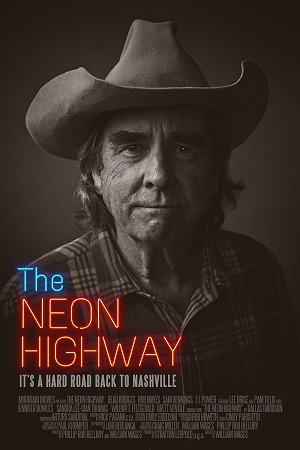 Wayne (Rob Mayes), dreams of becoming a successful singer/songwriter after a failed attempt in Nashville seven years earlier. He lives with his wife, Ginny (Jennifer Bowles) and their teenage son while working as a telephone repairman. When Claude Allen (Beau Bridges), a washed-up country music legend moves into town, Wayne befriends him before they head to Nashville hoping to get a record deal for his songs. Director/co-writer William Wages and co-writer Phillip Bellury have woven a mildly engaging story about redemption and following your dreams. The Neon Highway opens as Wanye and his brother, Lloyd (T.J. Power), perform their country song in Nashville before a tragic accident cuts their hopes and dreams of becoming famous short. Then there's a cut to seven years later when Wayne has settled down with his wife and son in Colorado. What happened during those seven years? The film doesn't really show that nor does it explain how Wayne met his wife. It's more interested in getting right to the meat of the story: Wayne and Claude's emerging friendship as they hit the road to Nashville. This isn't a road trip movie, though; it's about two people who inspire each other while sharing the same love for country music. Claude is cantankerous and suffers from alcoholism. He won't give up his determination to get a second chance at fame, though, so his enthusiasm encourages Wayne to pursue his dreams, too. Although The Neon Highway avoids becoming heavy-handed and melodramatic, it's neither profound nor unflinching enough to pack a powerful emotional punch. Beau Bridges gives a strong performance that grounds the film in authenticity and poignancy. The film's emotional depth comes from his performance instead of from the screenplay. The highlights, though, are the country songs which are full of heart and soul. That's when The Neon Highway truly soars. At 1 hour and 52 minutes, it's heartfelt and well-acted, but undercooked and somewhat shallow. The music is better than the movie.
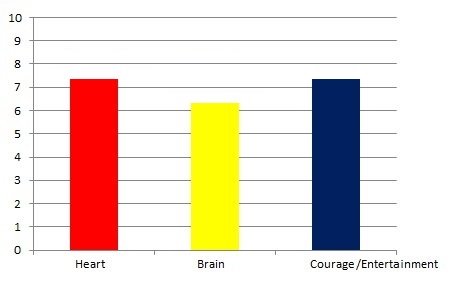 One Life 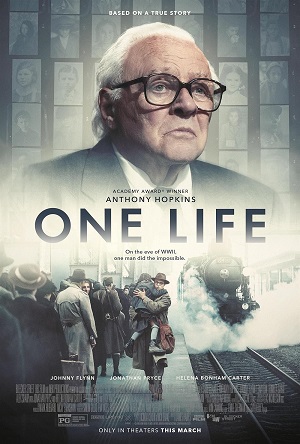 Nicholas Winton (Anthony Hopkins) recalls his younger years when he (now played by Johnny Flynn) joined his friend, Trevor (Alex Sharp), and Doreen (Romola Garai), an activist, on a rescue mission to save the lives of over 600 children from the Nazis in Czechoslovakia during the beginning of World War II.
Based on the book If It's Not Impossible...: The Life of Sir Nicholas Winton by Barbara Winton, the screenplay by co-writers Lucinda Coxon and Nick Drake is dull, shallow and surprisingly anemic despite a premise that has the potential to be both moving and gripping. One Life's systemic issue is that it never manages to get inside the heart, mind and soul of its heroic subject, Nicholas Winton. As a biopic, it feels incomplete without allowing the audience to get to know what's going inside of Nicholas both during his later years living with his wife, Grete (Lena Olinin), in the 1980s and back in 1938. The plot merely goes through the motions without letting any of the characters breathe while the dialogue suffers from being too on-the-nose. Subtlety and nuance aren't among the film's strengths. Cabrini also suffers from that same ailment, but in a way that's more cinematic and captivating. What was Nicholas' childhood like? How did he manage to find the courage and determination to keep trying to save as many children as possible even after a few setbacks. One Life squanders its opportunity to be an engrossing character study while also failing to generate any suspense during the scenes depicting Nicholas' rescue mission. The horrors of the Holocaust aren't shown which is fine because they remain in the imagination of the audience. However, why shy away from showing Nicholas' emotional and psychological struggles? It's as though the film were afraid to be unflinching, darker and deeper. Therefore, the third act's uplift ends up schmaltzy and unearned.
Anthony Hopkins delivers a solid performance that's occasionally moving, but he's undermined by the bland screenplay just like in Freud's Last Session. He brings gravitas to his role and it's also nice to see him again with Jonathan Pryce in a brief scene together after they both starred in The Two Popes. Helena Bonham Carter is decent as Nicholas' mother, but Lena Olin is wasted in an underwritten role. There are pacing issues because often the film crawls at a snail's pace. There's nothing exceptional about the cinematography or the production design. The editing feels very choppy and clunky at times, i.e. when Nicholas has a meeting with someone who wants to see the evidence that he collected of his rescue mission to potentially display at a museum. At a runnin time of 1 hour and 50 minutes, One Life is a stodgy, shallow and by-the-numbers biopic.
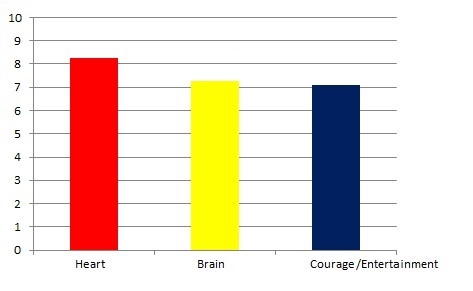 The Prank 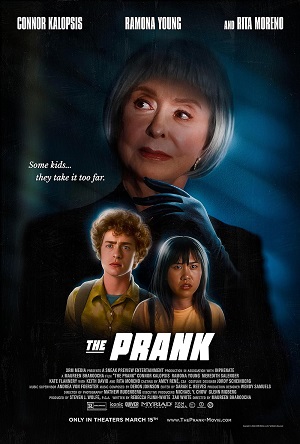 When his strict high school physics teacher, Mrs. Wheeler (Rita Moreno), flunks him and the rest of the class because of a student who cheated, Ben (Connor Kalopsis) and his best friend, Mei (Ramona Young), frame her for the murder of her former student who mysteriously disappeared years ago.
The screenplay by co-writers Rebecca Flinn-White and Zak White is a tonally uneven blend of crime thriller, mystery, satire and dark comedy. None of the beats land, though, because the plot becomes increasingly implausible with very silly twists. Mrs. Wheeler comes across as a mean and bitter teacher who has no shame in bullying her students to push them to their limit. She's so one-note with very little backstory that she's merely a caricature of an over-the-top, strict teacher. The Prank spends too much time trying to make the audience hate her without showing any empathy for her. Neither do Ben and Mei show much empathy for her or for anyone else either. They're self-centered, immature and conniving, so they're not very different than Mrs. Wheeler and hard to root for. The only someone likable character is Principal Henderson (Keith David). There are as many holes in the plot as there are in Swiss cheese. If The Prank were to lean more into its dark comedy elements, it could've been as clever and witty as Heathers or even The Faculty. Instead, in terms of the quality of its screenplay and direction, it's more along the lines of Teaching Mrs. Tingle with a third act that takes a very steep nosedive. Rita Moreno gives an over-the-top performance that almost, but not quite, veers toward campiness. The best performance, though, comes from the actress Kate Flannery in a supporting role as the cafeteria lady. According to the outtakes, which is the best part of the film, everyone seemed to be having a great time making the movie. It's too bad that they don't spread much of that enjoyment to the audience. At a running time of 1 hour and 35 minutes, The Prank is a clunky, unfunny, asinine and preposterous misfire.
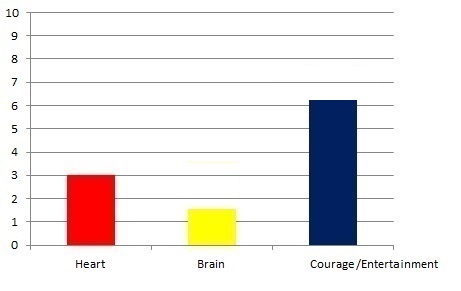 Snack Shack 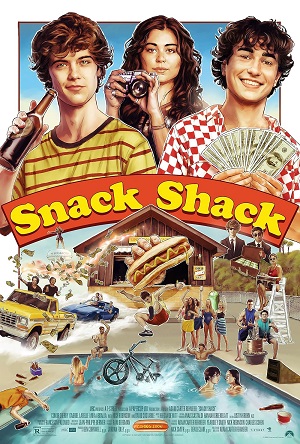
A.J. (Conor Sherry) and his best friend, Moose (Gabriel LaBelle), run a snack shack from the local public pool as summer approaches. They both flirt with Brooke (Mika Abdalla) who moves in next door. Meanwhile, A.J. 's friend Shane (Nick Robinson), arrives in town. Writer/director Adam Rehmeier has woven a film doesn't break any new ground, but it does capture the feeling of growing during the days before social media. Back then, believe it or not, when teens wanted to communicate, they called each other or spoke face to face. They spent more time outdoors or indoors hanging out and coming with new activities that don't involve computer games. A.J. and Moose are naive, impressionable teenagers who pass the time trying to come up with business endeavors. They first consider selling home-brewed beer, but soon after, they set their sights on purchasing the local pool's snack shack. In terms of narrative conflict and big spectacles, not much happens. There are no villains nor does the film go bonkers. Instead, the spectacles are of the more grounded type, i.e. A.J. and Moose's romantic interest in Brooke, their dreams after graduating high school or the evolving dynamics of their friendship. Like Richard Linklater, Rehmeier has a knack for writing dialogue that sounds unflinchingly real. There's a lot of profanity coming from A.J. and Moose. Their foul mouth does become a little excessive, but, to be fair, that's the way some teenagers talk. Judge (David Costabile) and Judy (Gillian Vigman), A.J.'s parents, are the only characters who feel like over-the-top caricatures, but there's a surprisingly poignant scene at the end with A.J. and his dad. Fortunately, Snack Shack, doesn't turn into a lowbrow comedy like Superbad or raunchy like Porky's. It has the warm, beating heart of a John Hughes movie. Gabriel LaBelle shines in a role that he elevates well above the screenplay. He's charismatic and knows how to handle the nuances of Moose. Moreover, he and Conor Sherry have palpable chemistry together which helps the audience to believe that A.J. and Moose are good friends from the get-go. The soundtrack is lively and well-chosen while the editing and cinematography helps to make the film feel a little but more cinematic. However, Snack Shack does overstay its welcome ever so lightly with its lengthy running time that approaches the 2-hour mark. Writer/director Adam Rehmeier hasn't grasped the concept that less is more in this case. At 1 hour and 52 minutes, Snack Shack is a funny, captivating and tender coming-of-age film.
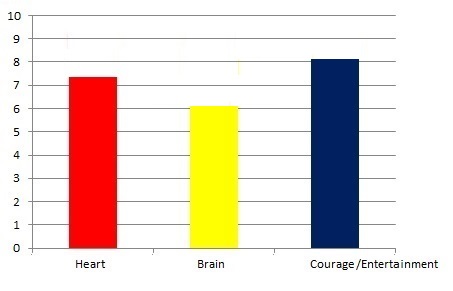 Uproar 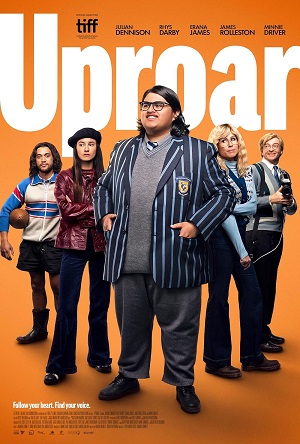 John (Julian Dennison), a 17-year-old Māori boy, lives in New Zealand with his single mom, Shirley (Minnie Driver), and older brother, Jamie (James Rolleston), and attends an all-boys Catholic school where he gets bullied. When a South African rugby team arrives in town and causes protests, he must learn how to embrace his Māori identity.
Set in 1981, the screenplay by co-writer/director Hamish Bennett and co-writer Sonia Whiteman finds just the right balance between humor and heart without being cloying, clunky or tonally uneven. John goes through a lot on an emotional level because he has to deal with bullies at school while taking care of his older brother who's injured and also coming to terms with his Māori identity. He's very passionate about pursuing his dreams of studying drama. With a less sensitive screenplay, the plot could've ended up an unfocused, meandering mess like with many films these days that bite off more than they could chew. Although Uproar bites off a lot as it deals with many topics, it also chews a lot without feeling undercooked. The filmmakers do a great job of bringing John to life and designing a window into his heart, mind and soul as he's juggling many emotions. It's inspirational and heartfelt to watch John grow up and become more emotionally mature throughout the course of the film. His bond with one of his teachers also feels authentic and moving. There are also more than a few scenes that provide comic relief with some witty dialogue, so Uproar also avoids becoming dry and dull. John's character arc feels organic, and the film fully earns its uplift. Julian Dennison gives a warm, radiant and charismatic performance. He finds the emotional truth of his role while opening the window into John's heart, mind and soul. So, kudos to him for his emotionally generous performance that displays John's strengths and vulnerabilities. Moreover, the soundtrack is lively and well-chosen while simultaneously adding substance to the film. At 1 hour and 50 minutes, Uproar is a triumph. It's a sweet, funny and engrossing coming-of-age story.
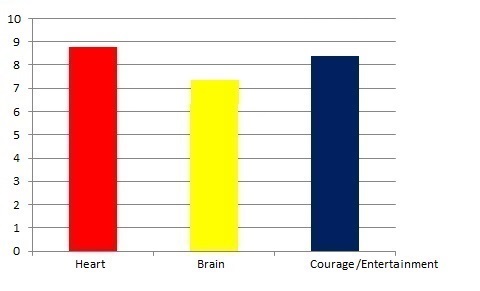 |